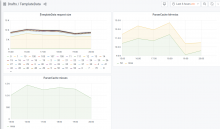TemplateData extension uses the following method to generate page properties:
/**
* @return string JSON (gzip compressed)
*/
public function getJSONForDatabase() : string {
if ( $this->jsonDB === null ) {
// Cache for repeat calls
$this->jsonDB = gzencode( $this->getJSON() );
}
return $this->jsonDB;
}Obviously the gzipped data can not be serialized to JSON as a part of the ParserOutput. We should probably remove the gzipping from this layer - if we do need to save on space, we can compress data on the storage layer.
Original parent is T263579
